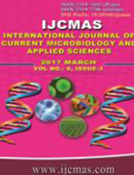


 National Academy of Agricultural Sciences (NAAS)
National Academy of Agricultural Sciences (NAAS)

|
PRINT ISSN : 2319-7692
Online ISSN : 2319-7706 Issues : 12 per year Publisher : Excellent Publishers Email : editorijcmas@gmail.com / submit@ijcmas.com Editor-in-chief: Dr.M.Prakash Index Copernicus ICV 2018: 95.39 NAAS RATING 2020: 5.38 |
Alternaria blight caused by Alternaria brassicae (Berk.) Sacc. has been reported as one of the most serious threat to the production of rapeseed and mustard which is reflected in various yield attributing factors eventually affecting the yield. The matter is of grave concern as both the crops have economic importance and fetch return to the growers merely on the basis of oil content. The present study was conducted in order to assess yield loss of rapeseed and mustard with respect to various yield attributing factors in various varieties under natural conditions. Differential response to Alternaria blight was observed which clearly instigated a scope of using resistant host varieties against Alternaria blight. Variety Kalyan (393.83) showed maximum number of pods per plant whereas the minimum number was shown by Agrani (232.87). Maximum number of seeds per pod (14.43) was seen in variety Kalyan followed by Bhagirathi (13.56). Likewise the test weight of 1000 seeds was found between 4.07g (Agrani) to Kalyan (8.70g). Variety Kalyan gave maximum yield (1544.75 kg/ha) while, it was minimum in case of variety Agrani (786.65 kg/ha). The observations also show that Alternaria has a direct effect on yield of rapeseed and mustard which was revealed by the fact that moderately resistant varieties had more yield (w.r.t. yield and other yield attributing factors) as compared to highly susceptible varieties. The pattern of yield of various cultivars gave almost similar results to prior studies based on different epidemiological parameters thus, showing the potential of forming a baseline for determining the reaction group of the varieties/genotypes against Alternaria blight under natural conditions.
 |
 |
 |
 |
 |